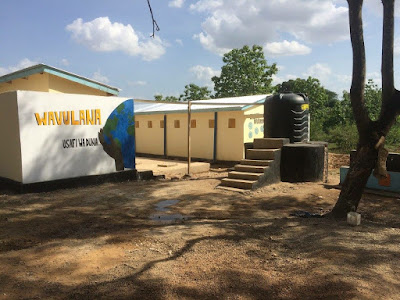Hi World and welcome to my new blog ' Water in a Changing World- What does this mean for Africa?'
This is my first time ever blogging, quite exciting really! This blog is part of my 3rd year Geography module 'Water and Development in Africa'. My blog will be exploring the complex relationship between Environmental change and Water in Africa, using a range of academic reports, news articles, books and videos. An array of topics will be covered, not only focussing on climate change, but also land use changes, and the impacts on water supply and quality, and the further implications this has for Africa, and their future.
The importance of water
Freshwater resources make up only a small fraction of water on the planet. While nearly 70% of the world is covered by water, only 2.5% of all the water on earth is freshwater. Even then <1% of this freshwater is easily accessible, with much of it trapped in glaciers and snowfields (Figure 1).
Water is a resource we often take for granted, especially living in the UK- London, having access to clean, running water, by the turn of a tap. It is a fundamental necessity; however, we can often forget that this is not the case for everyone around the world. Due to Geography, climate, engineering, regulation and competition for resources, some regions have an abundance of freshwater, while others experience drought, and access to minimal or no safe water supplies. The Increasing concern now is that the combination of Climate Change and a rapidly growing demand will magnify those extremes, and further threaten water supply.Climate change and water
Climate change is causing global increases in temperature on Earth. The mean annual temperature rise is likely to reach 2 ℃ by 2100 (Niang, 2014). Increasing temperatures of > 2 ℃ will have serious consequences including an increase in the number of extreme events. When most people think of the water crisis, they often think of years- long droughts or dry monsoon seasons. However, a further consequence is intensification of precipitation, with fewer, low and medium intensity precipitation events and more heavy precipitation events. This is because as temperatures increase, the holding capacity of water in the atmosphere will increase, leading to less frequent but more intense rainfall events (Owor et al, 2009).
While there is no way to predict exactly what the worlds water resources will look like in the future. It is projected that water stress- the measure of supply, relative to demand- will likely increase rapidly across the globe, as more people compete for fewer and limited supplies of surface-water.
Figure 2: Projected 2040 global water stress by country
So why Sub- Saharan Africa (SSA)?
- It is the most ethnically diverse region in the world.
- Most countries in Sub-Saharan Africa are classified as 'Developing' countries; whereby in strict economic terms, is one of the poorest regions in the world.
- It is home to the highest rates of population growth.
- It is the most rapidly urbanising region in the world and presently the most rural.
There are several reasons why poverty has become an epidemic in Africa: arguably the lack of access to clean drinking water is one of the greatest and often overlooked causes. The lack of water is an often-immeasurable obstacle, that has trapped many in the cycle of poverty.
Substantial increases in freshwater withdrawals and consumption is projected for the future of SSA. Therefore, with the growing concern of future water resources, this blog will explore what this means for the rapidly changing continent of Africa.
Substantial increases in freshwater withdrawals and consumption is projected for the future of SSA. Therefore, with the growing concern of future water resources, this blog will explore what this means for the rapidly changing continent of Africa.
Feel free to comment on my posts, and I look forward to learning about this ever complex issue, in this module in the coming months and hopefully beyond.






Can't wait to see where you take this Ronda!!
ReplyDeletethanks finn, hope you've got read some of my blog posts from this term, and found them engaging and an interesting read
DeleteYes, this is a good, scene-setting start!
ReplyDeletethanks Richard
DeleteHi Rhona,
ReplyDeleteGreat to see that your university offers a module that encourages you to delve deeper into a topic so crucial as water in the African continent. So, I'm excited to see how you go about blogging, whether it be making comparisons between specific regions or even placing a critical neo-colonial lens on your research.
Nice work!
S
thank you, hope you have enjoyed some of my other blog posts for this term. Although i never focussed on the developmental or even a neo-colonial critique on the water and africa debate, as i predominantly focused on the environmental change focus. Perhaps if i continue to blog on this topic in the coming year, i could take an approach such as the one you suggested.
DeleteThanks again